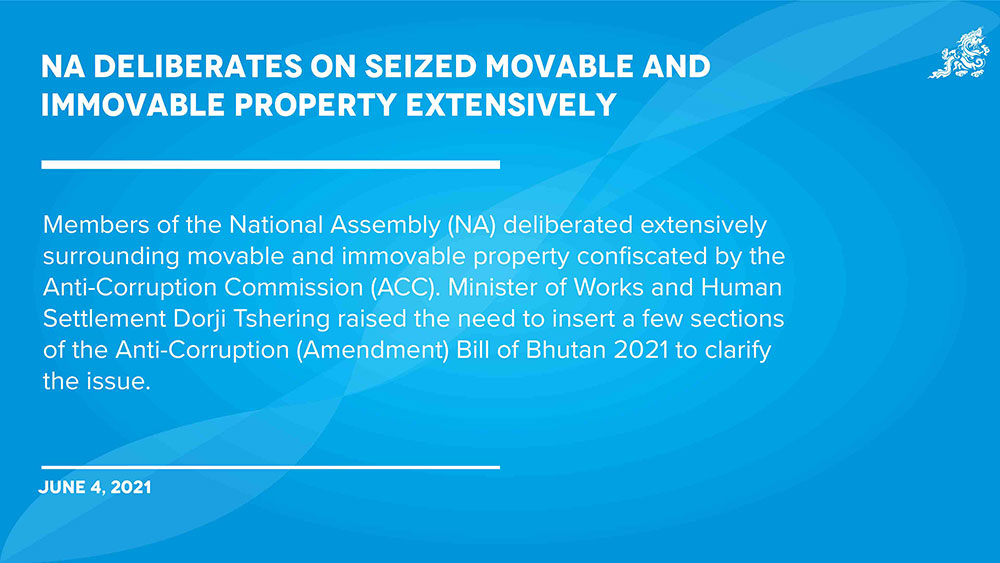The National Assembly (NA) members deliberated extensively on the moveable and immoveable property the Anti-Corruption Commission (ACC) seizes.
Works and Human Settlement Minister Dorji Tshering submitted the need for clarity on immoveable and moveable property seized by the ACC.
He said roads and houses, seized by ACC, cause great loss to the state. “We need to insert a few sections to provide clarity on it.”
NA’s good governance committee chairperson, Dewathang-Gomdar Member of Parliament (MP), Ugyen Dorji, proposed the insertion of two new provisions in the Anti-Corruption (Amendment) Bill of Bhutan 2021.
The two new provisions are section 104 (4) and 108 (3). Section 104 (4) states, “Any moveable property which is frozen, seized or confiscated under this Act may allow the use, operate or lease pending the outcome of the investigation or auction by the commission with approval from the Court as per the Rules and Regulations adopted by the commission.”
Section 108 (3) states, “Any immovable property or Developmental activities which are frozen, seized or confiscated may be allowed to use, operate, lease or continue work, pending the outcome of the investigation and prosecution with approval from the Court, as per the rules and regulations adopted by the commission.”
Gangzur-Minjey MP Kinga Penjor said it is not clear who should operate the seized properties. “I feel there is a need of a third party or a different organisation to take care of the seized properties.”
He also said the new clause states the seized properties could be auctioned. “But who will auction it, the defendant or ACC?”
Chhoekhor-Tang MP Dawa said the discussion on seized properties occurred in the past NA deliberations and at the National Council. “The Supreme Court then issued an order stating that the Office of the Attorney General (OAG) should take care of the seized properties and hand them over to Department of National Properties.”
He said ACC officials claimed they never stopped any properties from operating until now. “They said if a road construction was stalled, it could be the concerned agencies and not ACC.”
He also emphasised the importance of having clear directives on seized properties to ensure that the state does not suffer a loss.
Kanglung-Samkhar MP, Dr Samdrup R Wangchuk, said since a person is innocent until proven guilty, it is not fair to seize the properties before the due course of law is complete. “When properties are seized before the judgment is rendered, it is considering the person guilty.”
He said until the judgment is rendered, the defendants should be allowed to operate the properties. “By the time the judgment is rendered, the seized properties become useless when the state takes over or when it is returned to the defendant.”
Bartsham-Shongphu MP Passang Dorji cited examples of how a school construction in Trashigang stopped because of ACC investigation. “Although ACC clearly stated that the construction could go on, it did not. It is important we also specify how stalled construction should resume in the Act.”
Agriculture Minister Yeshey Penjor said since the law is enacted to bring peace, it is important the law is implementable. “The new provisions are mandating a mortgage to operate the seized properties, which will be difficult in implementation.”
Prime Minister Dr Lotay Tshering said the two new provisions have to be rectified, as they will not be implementable. “There has to be rules and regulations to implement the provisions.”
Drametse-Ngatsang MP Ugyen Wangdi, who is a member of the committee, said the committee discussed with ACC officials, who said that people do not want to hire seized movable properties. “Officials say the accused should be made to pay some amount and allowed to use the movable property until the judgment is rendered.”
He said ACC officials should seek approval from the court and auction the immovable property. “ACC officials said they never stopped any works on immovable property.”
Khatoe-Laya MP, Tenzin, who is also a committee member said section 104 (3) of the existing Act stated the commission should take care of any properties it seized and it is accountable for it.
He said the commission officials said that they have taken care of the properties. “But there are reports of seized properties getting damaged and it is important the new provisions are clear and have rules and regulations in place.”
Opposition Leader Dorji Wangdi, however, said there is no need to add the two new provisions, stating section 103 (2 and 3) specify how the seized properties should be taken care of.
He said when developmental activities are stalled because of ACC investigation, people are affected.
Finance Minister Namgay Tshering said it is important to keep the law open for interpretation for those implementing it.
He also said it is necessary to have rules and regulations.
Foreign Minister Dr Tandi Dorji said while ACC officials claim everything is good, there are problems like the hotel in Trongsa. “So it is important we clarify everything.”
MP Ugyen Wangdi said ACC officials told them they only said transaction of the seized property is not allowed in Trongsa hotel case, but they have given in writing that the proprietor could operate the hotel.
The hotel owner in Trongsa has contested the ACC’s freeze notice issued by the commission in 2015 ruined the whole resort beyond repair and asked the commission to compensate them.
Meanwhile, the committee will review the two provisions and submit them to the NA members today.
By Tashi Dema


